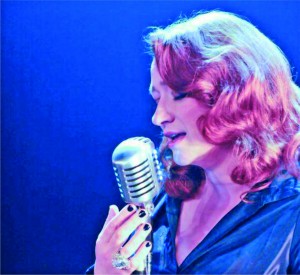
Last month some of Ireland’s biggest Eurovision stars performed a collection of the most memorable songs from the contest’s back catalogue at The Bord G·is Energy Theatre. Amongst them was Niamh Kavanagh, singer of the most beloved winning entry, In Your Eyes, but also remembered by older NewsFour readers as the cashier in Sandymount AIB. She chat’s here to Caomhan Keane.
Tell me about your earliest Eurovision memory?
My earliest memory, the most vivid one, was the Abba win. It was one of those nights you were allowed to stay up late, like when the football was on or Miss World.
What did you make of In Your Eye’s when you first heard it? Did you have any idea how deep it was about to stick its claws into the public consciousness?
Well I really liked it very much. I didn’t think we would win the Eurovision. I didn’t even think we would win the Euro song! We couldn’t get anyone to sign us before the Eurovision. Myself, publisher Bill Graham and writer Jimmy Walsh put the money in and recorded the final copy. We pressed 250 CD’s and cassettes so we would have something on the week of Eurovision. So there were only 25 of Ireland’s entry. We weren’t expecting the thousands and thousands of sales we got afterwards. It was no1 for a long time after. It pleased me of course but also surprised me.
Did you always want to perform at the song contest?
I had been offered different songs over the years. I was doing really well as a session singer, working with some of the best producers. I had no great interest in getting involved in the Eurovision. But I really liked the song, I had a chat with the writer and he said ‘your experience in Eurovision can be what you want’. And I still stand by the fact that I sang a really good song really well in front of 200 million people.
What goes on in the build up to the event?
There is so much to consider. The design, the stage, the lighting, the backing singer, what you are going to wear. All this needs to be planned well in advance. The TV station have more of a say, after all they are paying for you to do what you do, although I had more of a say in 2010 than in 1993. There are a lot of events around it as well. You travel to promote the song, doing up to 14 interviews a day, which is pretty full on considering I was working in a bank as well. And of course there is the recording of the post card, the little film that plays before each entry takes the stage.
You mentioned the bank there. How much time did you need to take off before and after the event?
Well I never went back, although I was initially on a career break. I took the two weeks prior to the contest off and the week itself. It was funny actually as on the day of the contest they had the big sign up saying take Monday off Niamh. And after I won they changed the sign to say take Tuesday off as well. But there was just so much on afterwards. I had to sign to Simon Cowell’s record label, Arista Records and do an awful lot of TV programs in a lot of different countries, promoting the song as a single.
Why did you go back in 2010?
I was obviously offered an awful lot of songs for Eurovision over the years. I had to feel the song was strong enough for me. The reason for my going back was the song. Then you can accept if you don’t do well. I donít think the votes reflected how well we did. I still feel the performance was good, it was a great song.
By Caomhan Keane

